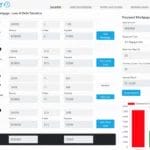
Benefits of a Debt Consolidation Calculator
October 3, 2023
Benefits of a Debt Consolidation Calculator
October 3, 2023If you're feeling the pinch at tax time and suddenly wondering why do i owe the ATO money, take a deep breath. Certainly, it's a situation many face, and there are reasons behind it. Let's look at why you might get a tax bill, how to deal with it, and key factors involved in the process.
Common Scenarios Resulting in owing the ATO money:
- Inadequate Withholding Tax Paid: If your employer or, as a sole trader or company, you haven't withheld sufficient tax, you might owe tax money at the end of the financial year (EOFY). Certainly, read the self employed example calculations at the end of this article on how businesses can incur a tax debt.
- Additional Income: Extra income sources from investments. Such as rental income, dividends, sale of shares or investment property. Otherwise, changes in family earnings, can lead to unexpected tax bills.
- Fluctuating Income: Irregular income, often the norm for freelancers, can result in inconsistent tax payments, leading to unexpected bills.
- Deductions and Expenses: Claiming deductions lowers taxable income, but wrong calculations or document errors can raise your tax bill.
Understanding Your Tax Estimate:
Understanding how to calculate your tax estimate is crucial. As the australian taxation office (ato) considers total income, deductions, tax rates, and the Medicare Levy Surcharge. Therefore, the final calculation determines whether you'll receive a tax refund or owe ATO money.
Additionally, there is the goods and services tax (GST) that needs to be accounted for if your income is over $75,000 pa. (minus the GST).
Paying Your Tax Bill:
Paying on time is essential. Firstly, ensure you can Access your myGov account. Secondly, then choose the ATO connected service from the various services from government agencies . Thirdly, acces your ATO account information and choose a suitable payment method. However, you can also set up a payment plan if needed. Keep in mind, attending to an outstanding tax bill early will give you a better chance to meet your financial obligations without unnecessary stress.
The Impact of the Low and Middle Income Tax Offset (LMITO):
The end of LMITO, aimed at helping households, may lead to Tax Office bills rising by up to $1,500, impacting those used to getting tax refunds. As a result, you would owe money to the Australian Tax Office.
ATO Debt Recovery and Payment Plans:
The ATO (Australian Tax Office) as the power to recover debts & money owed, potentially leading to liquidation or bankruptcy. While they may consider payment plans, debts may escalate over time, requiring additional security for longer-term plans.
Avoiding owing the ATO money:
Preventing tax bills involves calculating your tax using Tax Office tools and adjusting withholding declarations. Indeed you need to keep track of all the incomes earned. However, the best method as a self emplyed is to employ a registered tax agent to advise on your tax obligations.
Can You Go to Jail for Not Paying Tax?
No, not paying taxes won't lead to imprisonment. However, tax fraud (evasion) is a serious crime with severe penalties, including imprisonment. However, it involves the illegal abuse of the tax system.
To avoid getting a Tax Office bill, know why tax debts occur and stay updated on tax changes can reduce the risk of owing the Tax Office money. Also, promptly addressing any owed amounts can help you navigate tax time without undue stress.
Some simple step are:
- Firstly, stay on top of your banking & accounting.
- Secondly, lodge your tax return on time. Otherwise, you could incur penalties, or a payment plan cancelled if not paid by the due date.
- Thirdly, consider consulting a registered tax agent for advice for accurate advice. Additionally, lodging tax returns via a tax agent allows you to lodge your tax returns at a later date.
Why Small Businesses Often Face Tax Bills
A prevalent reason behind small businesses encountering tax bills is the practice of using business turnover for personal expenses without allocating funds for taxes. To illustrate, consider the following scenario:
John and Lydia manage a carpentry business with a monthly turnover of $11,000. However, Lydia, to assist with household expenses, took a secondary job, and the business covered significant costs such as the business expenses ($3,300 per month), home loan ($2,700 per month) and dining out ($1,000 per month).

| Income/Expense | Monthly Income/expenses | Tax |
|---|---|---|
| Business turnover | $11,000 | $1,000 GST Payable |
| Business expenses | $3,300 | $300 GST Collected |
| Monthly GST payable | $700 payable each month or $8400 annually. |
The GST has been collected from the clients. However, is then to be paid to the ATO. Therefore, if this is not paid in your quarterly BAS installment the tax owed with increase.
Personal Drawings:
Accounting errors are very common. Whereas, self employed tax payers may believe some personal drawings are claimable against their income. Consequently, this error can be realised when the income tax return is completed.
| Personal Expense | Monthly Expense Amount | Net Annual Expense |
|---|---|---|
| Home Loan | $2700 | |
| Restaurants | $1000 | |
| Total | $3700 | $44,000 |
- $44,000 net personal expense equates to approx. $53,000 in gross income.
- Therefore would require an annual tax payable of $7,692 + $1,062 (Medicare levy) = $8,754.

Business Surplus Calculations:
| Expense/Drawings | Monthly Amount | |
|---|---|---|
| Business turnover | $11,000 | |
| Business expenses | less $3,300 | |
| Personal Expense | less $3,700 | |
| Surplus Available | $4,000 | |
| GST | less $700 | |
| Personal Tax | less $729.50 | |
| Business Surplus | $2,570 |
Consequently, in most circumstances we see this business surplus is also used for personal expenses. As, if there isn't an understanding of the tax issue in paying the home loan there would also not be the understanding related to surplus from the business income. As a result, this would increase the tax issue as a result of the increased personal taxable income:
Re-calculation of the Tax bill
| Expense/Drawings | Monthly Amount | Annual Income Calculation |
|---|---|---|
| Personal Expenses | $3700 | |
| Additional Business Drawings: | $2570 | |
| Total Business Drawings | $6270 | Annual $100,300 before tax |
| Tax Payable on Business Drawings | $23,065 | |
| Medicare levy | $2,006 | |
| Total Payable to the ATO | $25,071 |
The earlier calculated $8,400 GST expense would be added to $25,071 also payable to the ATO. Indeed, the business faces a substantial tax bill of $33,471 in this single year upon lodging the tax return. However, if 2 years of Income Tax Returns are lodged together which we find is quite common then the amount would be multiplied.
Certainly, this highlights the importance of separating personal and business finances to better manage tax obligations.
This scenario is a common situation we are finding at the moment. Certainly, we are seeing this situation on an all too common basis. Indeed, the increase in cost of living is putting stress on the household budgets. Therefore, when a business allows instant access to cash the risk is using the business income and then not setting aside the tax to pay.
Summary:
If you receive a tax bill, don't forget to explore payment plans with the ATO.
if needed. Certainly, stay updated on Australian Taxation Office (for the Commonwealth of Australia) policy changes regarding taxable income and payment options. However, If you're still wondering why you owe the ATO money, explore alternative tax debt solutions on our website for more information.
The Australian Tax Office generally doesnt report an outstanding debt to credit reporting agencies unless the debt and business meet certain criteria. As such, the criteria noted by the tax office are: See the ATO for more details – https://www.ato.gov.au/individuals-and-families/paying-the-ato/if-you-don-t-pay/disclosure-of-business-tax-debts Otherwise, assess your consolidation options with a Debt Consolidation Calculator Yes, the ATO can issued you with a garnishee notice on your bank account. However, this must be granted by a court of law. Consequently, the garnishee order would demand payment in a specified period of time. Otherwise, it could result in funds being drawn, accounts frozen and your trading accounts suspended. Certainly, this is a late stage collection of tax debt, whereas you would certainly be very close to your business being wound up.
Why do i owe ATO money to the ATO FAQs
